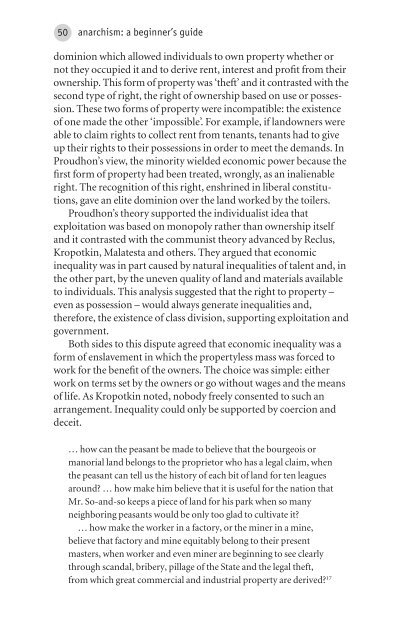o_195qg5dto17o4rbc85q1ge61i84a.pdf
Create successful ePaper yourself
Turn your PDF publications into a flip-book with our unique Google optimized e-Paper software.
50<br />
anarchism: a beginner’s guide<br />
dominion which allowed individuals to own property whether or<br />
not they occupied it and to derive rent, interest and profit from their<br />
ownership. This form of property was ‘theft’ and it contrasted with the<br />
second type of right, the right of ownership based on use or possession.<br />
These two forms of property were incompatible: the existence<br />
of one made the other ‘impossible’. For example, if landowners were<br />
able to claim rights to collect rent from tenants, tenants had to give<br />
up their rights to their possessions in order to meet the demands. In<br />
Proudhon’s view, the minority wielded economic power because the<br />
first form of property had been treated, wrongly, as an inalienable<br />
right. The recognition of this right, enshrined in liberal constitutions,<br />
gave an elite dominion over the land worked by the toilers.<br />
Proudhon’s theory supported the individualist idea that<br />
exploitation was based on monopoly rather than ownership itself<br />
and it contrasted with the communist theory advanced by Reclus,<br />
Kropotkin, Malatesta and others. They argued that economic<br />
inequality was in part caused by natural inequalities of talent and, in<br />
the other part, by the uneven quality of land and materials available<br />
to individuals. This analysis suggested that the right to property –<br />
even as possession – would always generate inequalities and,<br />
therefore, the existence of class division, supporting exploitation and<br />
government.<br />
Both sides to this dispute agreed that economic inequality was a<br />
form of enslavement in which the propertyless mass was forced to<br />
work for the benefit of the owners. The choice was simple: either<br />
work on terms set by the owners or go without wages and the means<br />
of life. As Kropotkin noted, nobody freely consented to such an<br />
arrangement. Inequality could only be supported by coercion and<br />
deceit.<br />
… how can the peasant be made to believe that the bourgeois or<br />
manorial land belongs to the proprietor who has a legal claim, when<br />
the peasant can tell us the history of each bit of land for ten leagues<br />
around? … how make him believe that it is useful for the nation that<br />
Mr. So-and-so keeps a piece of land for his park when so many<br />
neighboring peasants would be only too glad to cultivate it?<br />
… how make the worker in a factory, or the miner in a mine,<br />
believe that factory and mine equitably belong to their present<br />
masters, when worker and even miner are beginning to see clearly<br />
through scandal, bribery, pillage of the State and the legal theft,<br />
from which great commercial and industrial property are derived? 17




